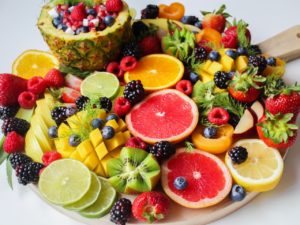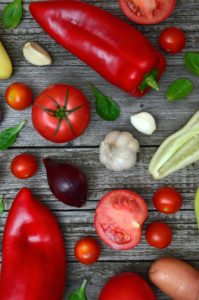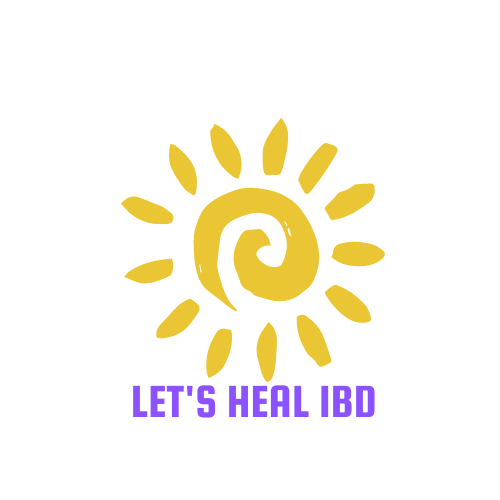Plant Based Diet for IBD
Have you ever wondered what diet is best to follow if you have IBD? I am creating a new series where I profile, discuss, and explain various diets that can be used to help manage IBD.
This week we will discuss a plant based diet for IBD.
We will discuss
- What is a plant based diet?
- How does it help?
- Potential drawbacks
- Advice on starting a plant based diet
- What about gluten?
What is a Plant Based Diet?

A plant based diet is an umbrella term used to define any diet that is based around the consumption of plants. It ranges from a strict vegan diet, to a lacto-vegetarian, and semi-vegetarian diet.
Most studies that have looked at a plant based diet for IBD define a plant based diet as follows. A diet that consists of fruit, vegetables, potatoes, legumes, plain yogurt, fish once per week, and meat once a fortnight.
It is important to note that a plant based diet for IBD, does not include processed foods. It uses whole, plant based ingredients. This may differ from a standard vegan or vegetarian diet which can include processed meat alternatives. Or other processed foods like candy or bread.
How Does It Help?
IBD is a chronic disease with genetic factors, and environmental contributions. Epidemiology studies have found that diets high in animal fats, and low in fruits and vegetables are the most common pattern associated with an increased risk of IBD. As well as strong association with eating a highly processed diet.
In this amazing study 46 IBD patients were put onto a plant based diet as outlined above. It found that in Crohn’s disease patients a plant based diet was extremely effective in maintaining remission. 100% of patients following a plant based diet were in remission after year one, and 90% were in remission after two years.
Plants help manage IBD in two ways.
The first is that plants help restore the gut microbiome. They are the favourite foods (prebiotics) for the good bacteria in our guts. The more plants you eat, the healthier your gut microbiome is likely to be.
The second way that plants help IBD management is that plants are anti-inflammatory. Plants have many properties that make them anti-inflammatory. Including containing polyphenols and flavonoids which both reduce inflammation.
In fact plants represent the main source of molecules for the development of new drugs and medicinal therapies. They are widely recognized to be healing.
On the flip side, meat products are pro-inflammatory foods. It is widely known that red meat, and processed meat increases inflammation in the body. But what about chicken and pork? While these meats have not been as widely studied. The research into chicken and pork shows that they are in fact pro-inflammatory foods.
Potential Drawbacks
Like any diet there are some potential drawbacks to consider. If you follow a strict vegan diet, you will need to supplement with B12 as no plant sources contain this vitamin. You will also have to ensure proper levels of iron and calcium are maintained.
Following the plant based diet as outlined above (that includes plain yogurt, and weekly fish) reduces the risk of these drawbacks.
There is also another obvious concern with a plant based diet for IBD, what about fiber?? It is widely thought that patients with IBD need to eat a low fiber diet. The same research study that found high remission rates in patients following a plant based diet. Found that their experience refuted this.
They provided the patients in their study with a plant based diet, high in dietary fiber. Even in the active phase of IBD (and even in patients with strictures) and found no negative outcomes of eating a high fiber diet on IBD.
Advice for Starting Plant Based Diet for IBD

If you are interested in trying a plant based diet for IBD management. I have created a few tips that will help you ease into the diet.
- Start slow, use caution when adding high fiber sources
- Add new foods one at a time in order to find your specific food intolerances
- Cook vegetables to aid in digestion
- Chew foods very well, or consider blending to aid in digestion
- Drink enough water as this may help with the digestion of fiber
- Avoid processed meat replacements that are full of harmful added chemicals
What About Gluten?
I honestly had a difficult time finding solid research into this topic. Many people with IBD follow a gluten free diet, even when they do not have celiac disease. The research shows that when a patient is in a flare, or presenting symptoms of IBD. It may be beneficial to eat a gluten free diet.
Once a patient is in remission (and if they are not celiac), they may be able to add gluten back into their diet without an increase in IBD symptoms.
When eating gluten containing foods, it is always best to eat organic. Non-organic wheat contains glyphosate (otherwise known as RoundUp) which is a herbicide sprayed on the wheat. Glyphosate is a controversial herbicide as it is widely thought to be the cause of many celiac cases, and gluten intolerances.
Glyphosate has been found to be a potential environmental trigger in the etiology of gut dysbiosis associated diseases including IBD.
Overall it can be seen that a plant based diet can be highly recommended for people with IBD. Research has shown that overall a plant based diet is a healthy diet for all humans.
For people with IBD, a plant based diet may help heal gut dysbiosis, reduce overall inflammation, and maintain remission long term.
